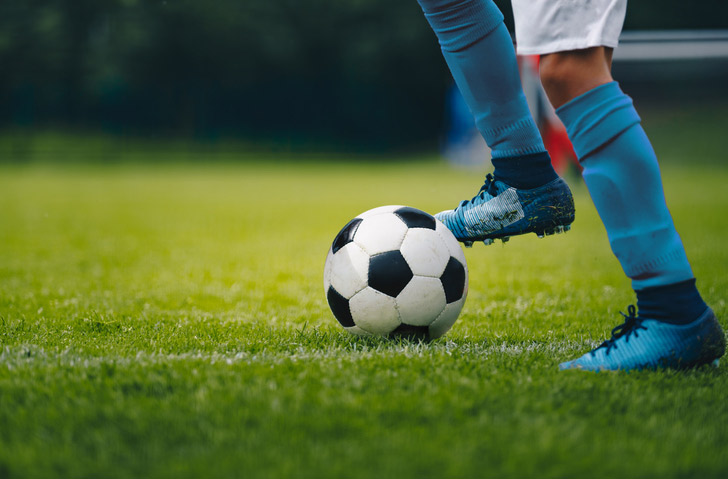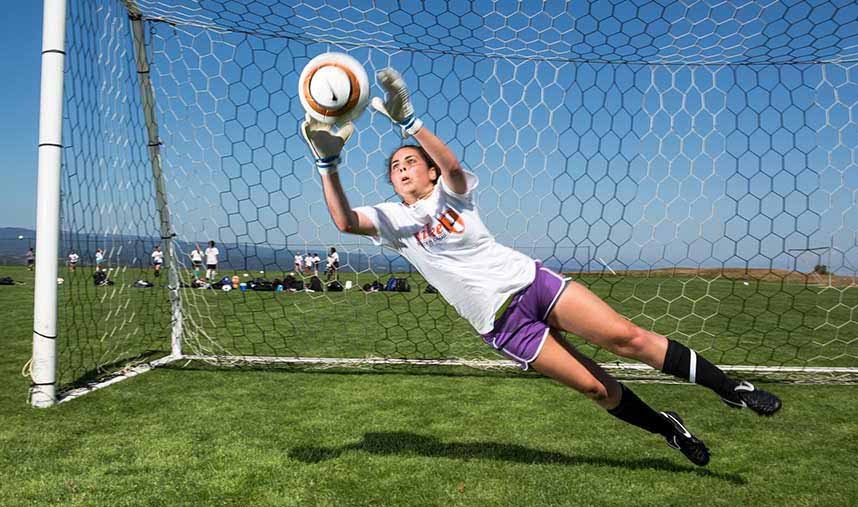
A team of five players plays soccer. There can be three men and two women in a coed league, but other players are permitted. Four players are required to play in an official game. It's played over two halves of approximately 28 minutes, with a running clock and a 1-2 minute halftime. Learn the different roles and responsibilities of each player on the field. These are the most important rules you should know before joining a soccer team.
Goalkeeper
The ultimate sweeper in soccer is the goalkeeper. Their role can change depending on what their team is doing on the pitch. Goalkeepers can help their team retain possession of the ball by playing out from the back, drawing the opposition in and creating a larger space for their attackers. You will need to be able to pass and ball handle under pressure. Here are some tips for becoming a good goalkeeper.

Outfielders
Soccer outfielders play near the opposition's goals and are responsible for protecting the goal. They typically begin the game on the midfield line and move forward, often not going near their own goal. They must also stay close to the midfield line in order for the defensive players to do their jobs properly. When the ball comes back to them, they must be ready to score. The following describes the four positions that outfielders can play.
Corner kicks
A corner kick is a type or free kick that is taken from one side of the field. A team might decide to pick a certain player to kick the corner kick and to choose an angle from which to do so. The average team only gets a corner-kick once every ten matches, but it can be very beneficial for a group to get one.
Shoulder barge
To push their opponent without using their arms, players use the shoulder barge technique in soccer. A shoulder push is when a player presses against a opponent's shoulder. Referees will consider this a foul. To be able to claim control of the ball, a shoulder barge in soccer is a funny way to do so. It is possible to raise the ceiling of a soccer stadium if it is done properly. It is important to understand that there are limitations to this technique. These limitations are listed below.
Slide tackle
A slide tackle is a great way to tackle the ball in soccer. It works best when the defender is able to apply force quickly and effectively to the ball without knocking the ball out of play. The slide tackle requires a defender to run along with an attacking player and hook the ball by using a bent foot. The player cannot prod with his or her toes. They should instead use their outside foot to apply maximum force on the ball.

Penalty Kick
Penalty Kicks in association football are a restart of play. A penalty kick is when a player takes a spot from which he was given for committing a crime that would have been punishable by a free kick. A player is awarded a penalty kick when he commits an offence in his own penalty area that would otherwise result in a direct free kick. The kick is defended by the goalkeeper from the opposing side.
FAQ
What are the main types of soccer played?
There are four main styles of soccer: association football (soccer), futsal, beach soccer, and indoor soccer.
The most popular form of soccer is called "football" or association football. It is played between two teams of 11 players on a field divided into three sections: an attacking area, a defensive area, and a neutral zone. Each player wears an individual number on his shirt. They can only play one section of the field at time. All footwear is allowed except for cleats. There are no offside regulations. However, defenders must not handle the ball unless the attacker is directly involved. The goal of the match is to score goals by getting the ball through the goalkeeper and into the opponents' goal. The winner is the team whose players have scored the most goals.
Futsal refers to indoor football. Each team consists of five players. There are no offside rules. Each goal is worth one point. Matches last 20 minute per quarter with five-minute breaks.
Beach soccer is a modified version of traditional soccer. Players can use sand to replace grass. Beach soccer has become more popular because it provides a safe place for children to learn the game.
Indoor soccer is played within a gym or stadium. Teams consist of 9 players each and there are offside rules. The goal must be at least 10m from the other player and is worth 2 points. Matches last for 30 minutes with three-minute breaks in between.
What does a goalie in soccer do?
Goalies are responsible to keep the ball from entering the net of an opposing team. Goalies stop the ball from reaching the net by using their hands, feet and head.
What size soccer ball should I buy?
To determine how big a soccer ball you will need, measure yourself. Measure straight up with your arms extended at your sides. You can measure your chest around the tape measure just below your armpits. This measurement is the circumference your torso. Divide this number and multiply it with 5. For example, if your chest measures 40 inches, divide 40 by 2 and multiply by five, which equals 20. That is the circumference of a sphere with a diameter of 20 inches. This formula can be used to calculate the size of your soccer ball.
What does the letter "A" stand for in soccer?
The letter "A" is for Association Football. It is the official nickname of soccer. The association word comes from the fact the game was originally developed by Oxford University students.
How do you score a goal when playing soccer?
Soccer is all about getting the ball past the defense of your opponent and into their own goal. The ball becomes a goal once it reaches the goal. Soccer games award points for goals.
What is the difference in football and soccer?
Both soccer and football have similar rules. Both require that a ball is kicked through a narrow opening known as a goal. Soccer requires that players pass the ball by running, rather than just kick it. Soccer also uses smaller balls to play with than football.
Statistics
- The word "soccer" is a British invention that British people stopped using only about 30 years ago, according to a new paper by University of Michigan professor Stefan Szymanski. (businessinsider.com)
- Even with the new issuance, control of the club will be retained by the Glazer family as they will retain 67% of B shares which have voting power, so little will likely change in the general approach taken to the finances of the club. (sites.duke.edu)
- the estimated cumulative television audience for the 2006 World Cup in Germany was 26.2 billion, an average of 409 million viewers per match." (en.wikipedia.org)
- After hosting an entertaining World Cup finals in 1994, the United States possessed some 16 million football players nationwide, up to 40 percent of whom were female. (britannica.com)
- From the 1850s onward, industrial workers were increasingly likely to have Saturday afternoons off work, and so many turned to the new game of football to watch or to play. (britannica.com)
External Links
How To
How to improve your soccer passing
The most important skill in soccer (football) is passing. It involves moving the ball around between players and maintaining possession. The ability to pass accurately and quickly is essential to success.
To learn how to pass well you need to know the types of passes and where and when they should be taken. These passes should be practiced until they become second nature. There are four main categories of passes - short passes, long balls, through balls, and through passes. Short passes are made from close range and move the ball forward. Long balls will be thrown to the opponents' penalty area. Through balls are thrown directly in the middle of a pitch. After that, through passes are made to another member of your team who plays the ball back towards your goalkeeper.
Try to be simple when passing the ball. Also, make sure your partner has enough space before receiving it. Insufficient space can cause your teammate to lose his balance and/or fall, which could result in him losing control of their ball. You should cover your teammates whenever possible when playing defense. Your opponents will not be able to use your teammates to attack.
Another thing you need to remember is not throwing the ball away. Throwing the ball away makes it harder to score because the opposing players could take advantage of your mistake. Always look for scoring opportunities and open spaces. Any gaps in your defense should be exploited.
You can improve your playing ability by practicing every day. Do some drills before you go to the next match. You should warm up well before you start a game. Then, you should give everything you have got during the game. Keep your head calm and cool. These tips will allow you to perform better in a game.